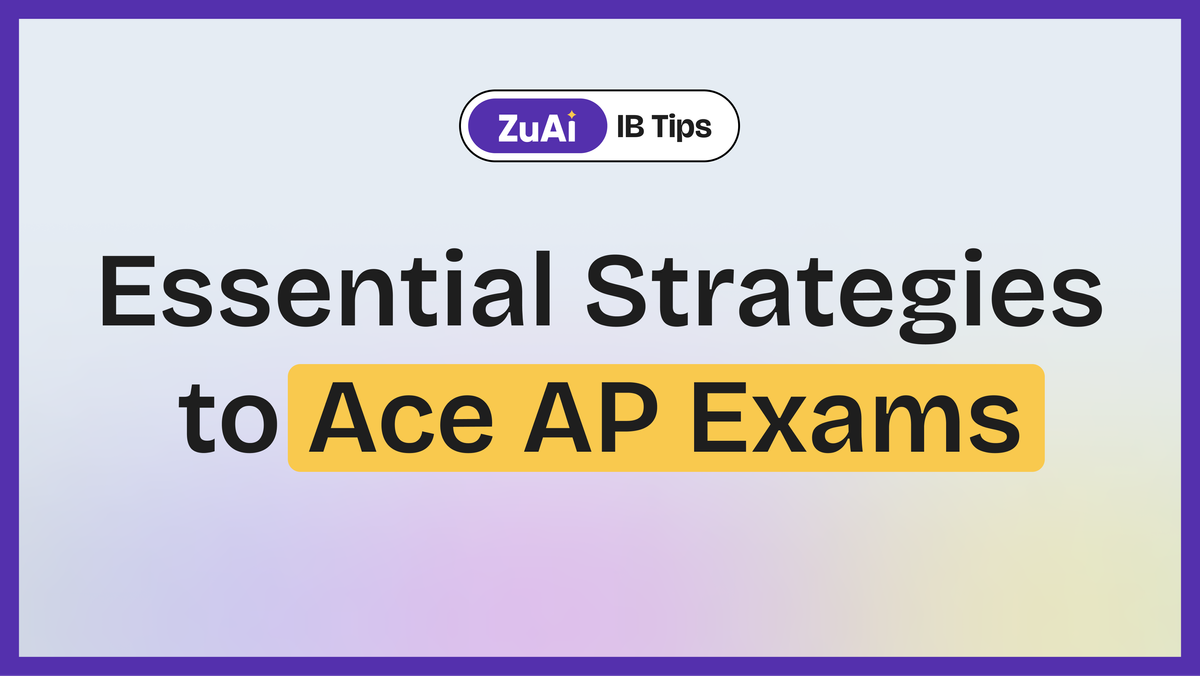Essential Strategies to Ace AP Exams: A Comprehensive Guide for College Board Students

Author: Michael Green, AP Instructor & Exam Coach
Preparing for AP exams can be challenging, especially with the extensive material covered across subjects like AP Calculus, AP U.S. History, and AP Biology. With the right strategies, you can achieve top scores and maximize your potential. This guide offers targeted tips to help you succeed in AP exams and make the most of your College Board experience.
Essential Strategies to Ace AP Exams: A Comprehensive Guide for College Board Students
Understanding the Importance of AP Exams
AP exams provide students the chance to demonstrate college-level knowledge in specific subjects, potentially earning college credits or advanced placement. Scoring high on these exams can strengthen your college application and even save on tuition. With top scores, AP students can gain a significant advantage in the competitive college admissions process.
Step-by-Step Guide to Excelling in AP Exams
Step 1 – Develop a Personalized Study Schedule
Every AP exam requires a focused study approach based on its specific content and format. Begin by assessing your strengths and weaknesses in each subject, and then create a study schedule that prioritizes the areas where you need the most improvement.
Tips for an Effective Study Schedule:
- Allocate daily or weekly blocks to different subjects.
- Use practice questions and past AP exams to identify areas for review.
- Break down complex topics into manageable sections, revisiting them regularly to reinforce learning.
Step 2 – Utilize AP-Specific Resources
The College Board offers an array of AP study resources, including course descriptions, exam guides, and practice questions. Use these resources as your foundation for understanding the exam structure, question types, and grading criteria.
Recommended Resources:
- AP Classroom: Offers unit-based quizzes, topic questions, and personalized progress tracking.
- College Board’s AP Central: Provides official practice exams, exam scoring guidelines, and past exam questions.
Additionally, review books and online courses specific to AP subjects, such as Barron’s, Princeton Review, and Khan Academy, can provide further clarity and practice.
Subject-Specific Strategies for Top AP Exams
AP Calculus AB/BC
Focus on Core Concepts: Master foundational calculus concepts like limits, derivatives, and integrals, which are frequently tested.
Practice Free-Response Questions: Calculus free-response questions often involve multi-step calculations. Practice organizing your answers clearly and showing all work, as AP graders award points for demonstrating your problem-solving process.
AP U.S. History (APUSH)
Develop Strong Essay-Writing Skills: APUSH exams require DBQs (Document-Based Questions) and LEQs (Long Essay Questions). Practice structuring your essays with clear thesis statements, supporting arguments, and relevant historical evidence.
Memorize Key Dates and Events: Knowing the timeline of major events is essential. Flashcards can help you memorize important dates, turning points, and Supreme Court cases.
AP Biology
Focus on Understanding Over Memorization: AP Biology emphasizes the application of scientific principles rather than rote memorization. Practice interpreting data, graphs, and experiment-based scenarios.
Use Diagrams and Visuals: Biology involves complex processes (like cellular respiration and photosynthesis), and diagrams can help you visualize and remember these processes more easily.
Practice and Time Management Tips
Step 3 – Take Timed Practice Tests
Simulate exam conditions by taking full-length, timed practice tests. This helps you gauge your readiness and adapt to the pacing required for each AP exam. Focus on time management to ensure you can complete each section within the allotted time.
Pro Tip: Review each practice test afterward, focusing on any incorrect answers to pinpoint areas that need more review.
Step 4 – Utilize Active Recall Techniques
Active recall, or testing yourself on material without referencing your notes, has been shown to improve memory retention. Techniques like flashcards, quizzes, and summary writing can reinforce your understanding of AP topics.
Tools to Try:
Quizlet: Great for flashcard-based learning across all AP subjects.
Anki: Uses spaced repetition, ideal for memorizing formulas, terms, or key dates.
Managing Stress and Staying Motivated
Step 5 – Incorporate Self-Care into Your Routine
The weeks leading up to AP exams can be stressful. Prioritize self-care by scheduling breaks, exercising, and maintaining a healthy diet. Practice stress-reducing techniques like meditation or deep breathing exercises to stay focused.
Step 6 – Set Short-Term Goals
Motivate yourself by setting achievable goals, like completing a certain number of practice questions each week or improving your accuracy in specific topics. Reward yourself for reaching these milestones to stay positive and motivated.
Bonus Tip: AI app for IB Exams = ZuAI
It's the ultimate AI app designed to help your child excel in their IB exams. As a parent, you want the best for your child, and so do we.
ZuAI provides personalized study support, practice questions, and detailed explanations tailored specifically to the IB curriculum.
Think of it as a smart tutor who understands your child’s unique learning needs, helping them tackle challenging subjects with confidence.
With ZuAI, you can feel reassured knowing your child is getting the extra help they need to succeed and build a bright future.
We genuinely care about your child's success and are here to support them every step of the way.

Looking for free solutions to previous year's question papers? Check out ZuAI's YouTube channel.
FAQ Section
Frequently Asked Questions
Q1: How many AP exams should I take?
It depends on your goals, interests, and capacity. While taking multiple AP exams can strengthen college applications, aim for subjects that align with your intended major or field of study.
Q2: What AP score is considered “passing”?
A score of 3 is generally considered passing, but many colleges only accept scores of 4 or 5 for credit or placement. Research each college’s AP score policies to understand what’s needed.
Q3: Can I retake an AP exam if I don’t score well?
Yes, you can retake AP exams the following year. Your college application will show your highest score if you’ve taken an exam more than once.
Q4: How should I prepare for AP free-response questions?
Practice writing clear, concise answers. AP free-response questions often reward the logical progression of your thought process, so focus on structuring your response clearly.
Q5: Are AP exams worth college credit?
Many colleges offer credit for high AP scores, allowing you to skip introductory courses. However, policies vary by college and program, so check individual credit policies.
Conclusion
Preparing for AP exams is a journey that requires strategic planning, consistent effort, and effective time management. By following these strategies, you’ll be well-equipped to excel in your exams and achieve scores that open doors to college credits and advanced placement. Remember, with the right resources and study techniques, you can approach your AP exams with confidence and achieve your best.
Good luck with your AP journey, and stay committed to your goals!
